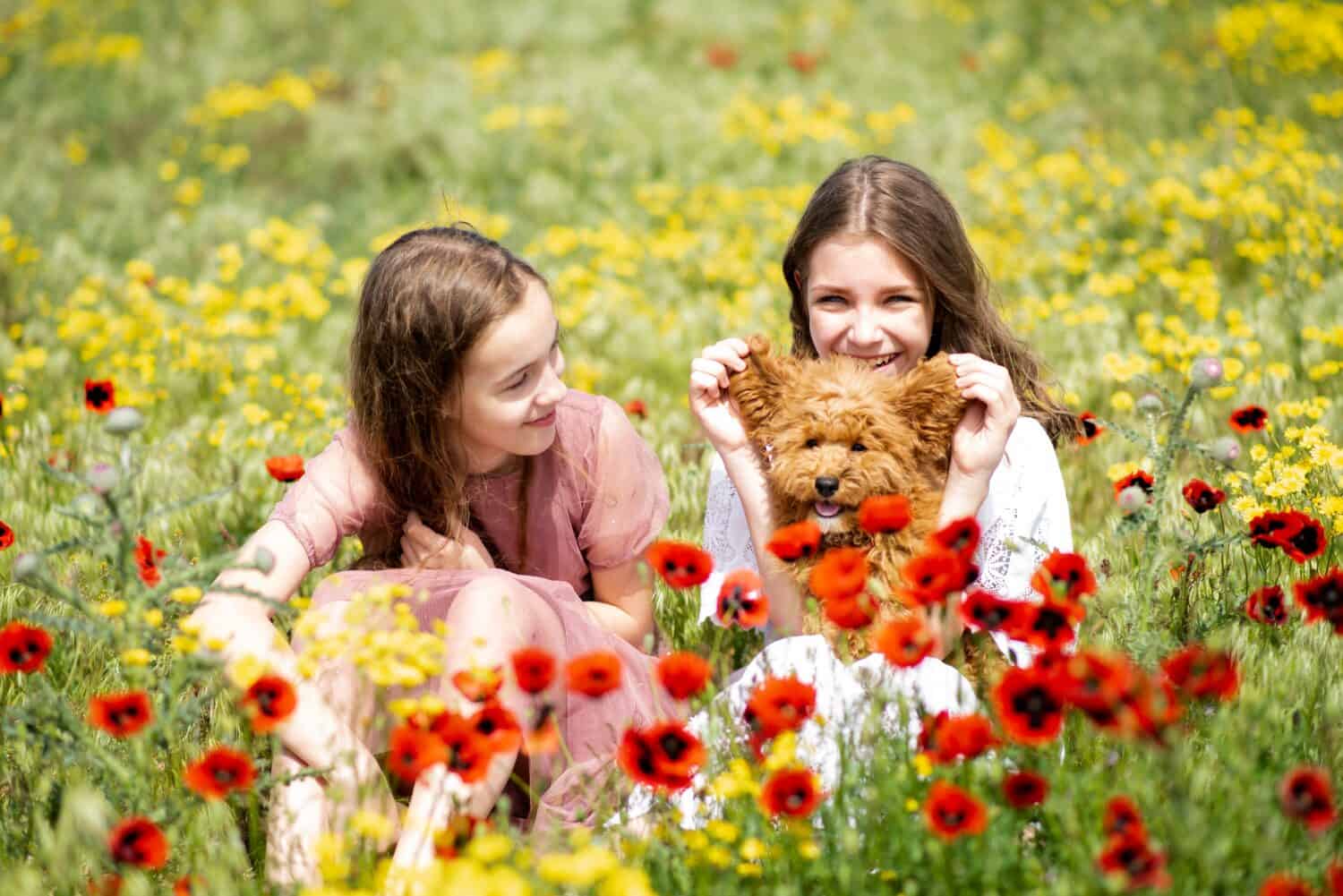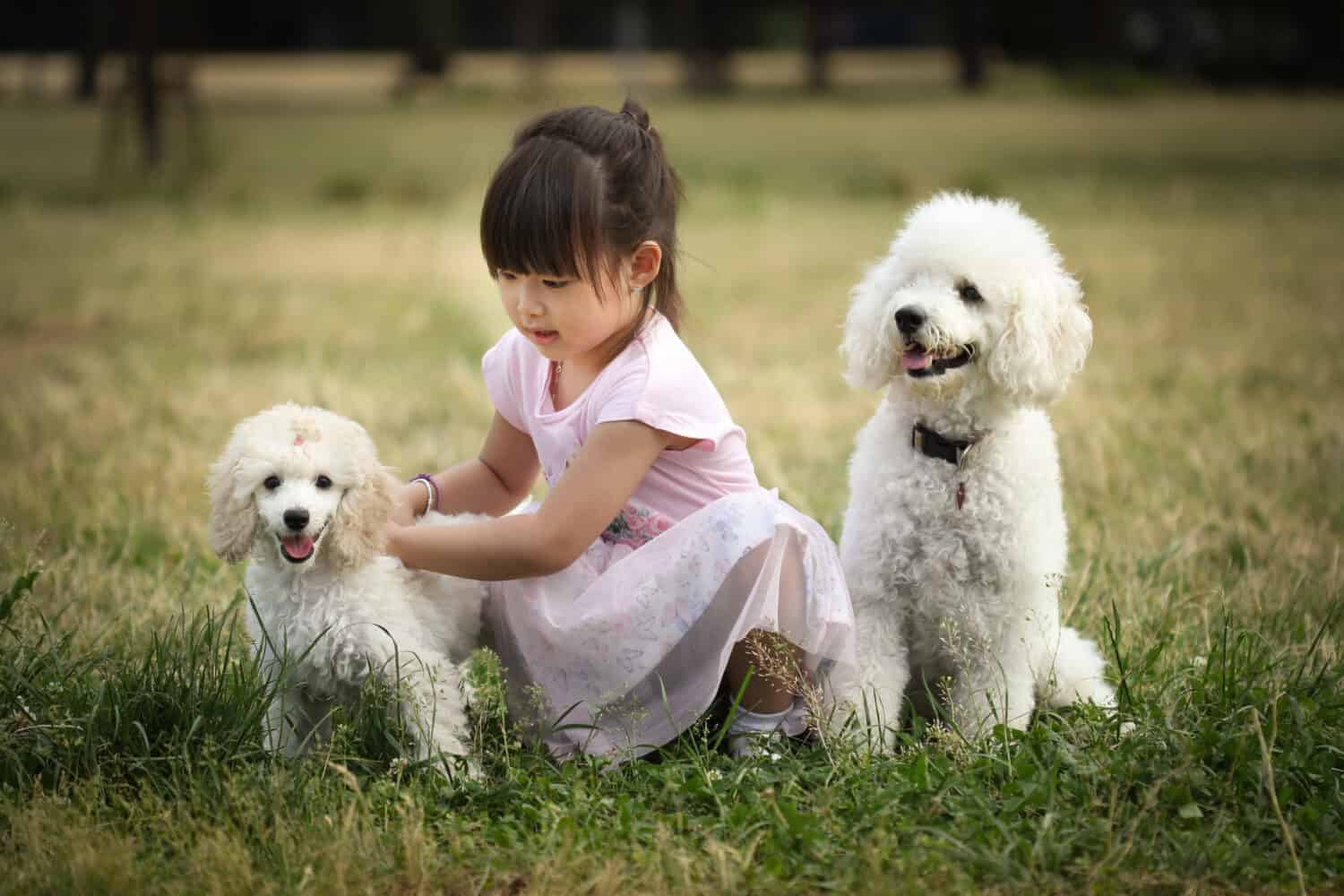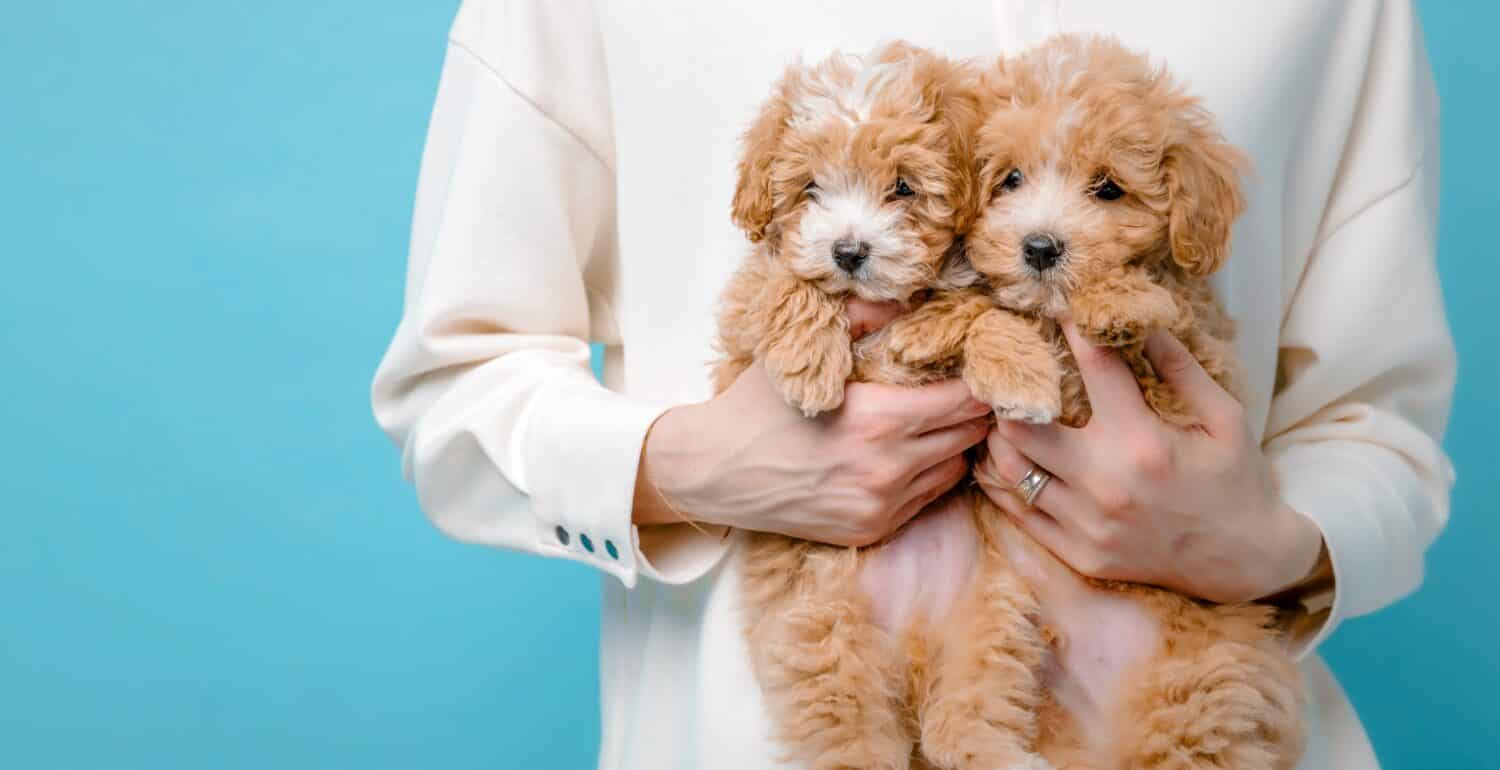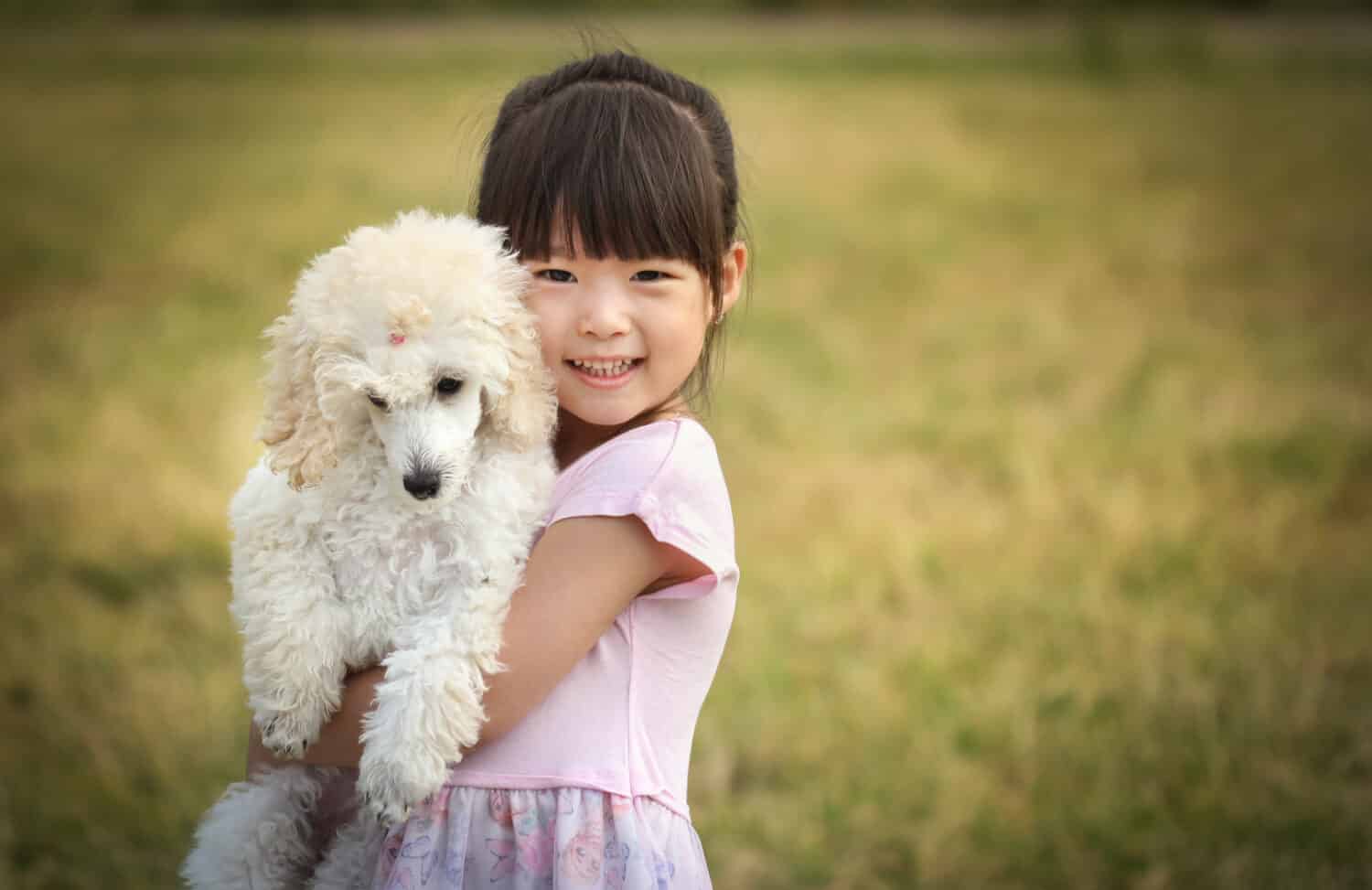If you're going to add a pet to your family, it's crucial that you get one that matches your family's lifestyle and vibe. Today, we're investigating the merits of Toy Poodles as pets for families with half-pint members. Toy Poodles have the reputation of being spicy little companions, with razor-sharp intellect and personalities with panache. Before committing to any fluffy fur friend, you need to ask questions about temperament, personality traits, health issues, cost, lifespan, and much more. Here, we take a deep dive into how Toy Poodles mesh with most families and discuss how they blend with kids of various ages.

©Natalya Temnaya/Shutterstock.com
Toy Poodle Puppies: Trouble Detector 101
Before we dive into the world of Toy Poodles, it's essential to understand how to approach and understand any puppy, regardless of the breed. After all, you want to ensure you're not welcoming a furry tornado into your home, right? (The joke's on us; we know how energetic puppies can be!)
- Temperament Check: Spend time with the puppy and see if they're friendly, outgoing, and comfortable with new experiences. A well-socialized pup is a great sign.
- Behavior Around Kids: Observe how the puppy interacts with your children. Are they gentle, playful, and patient? Toy Poodles tend to be good with kids, but individual temperament varies. (If you are adding a puppy to your family, you are also responsible for teaching your children the correct way to interact with the pup to keep everyone safe.)
- Energy Level: Keep an eye on their energy level. Toy Poodles are active, but you don't want a pup that's constantly bouncing off the walls. You can also ask the breeder or current caretaker about the pup's energy levels throughout the day.
- Health History: Ask the breeder for the puppy's health records. It's essential to know about vaccinations and any potential genetic issues. Some veterinarians don't accept vaccination records if breeders are the ones to administer the shots. This can be due to questions of dosing, preferences in medicine brands, or a general practice policy of ensuring that all vaccinations are accurate by administering the vaccinations themselves. For this reason, check with your veterinarian about their policies and your breeder to understand if early vaccinations are an extra charge so that you don't pay for a vaccination twice.
Now, we have to state some facts: puppies are a lot of work. They all have a lot of energy, and even the smartest breeds need training, housebreaking, and socialization. Adding any puppy to the mix will add a little chaos to your home, regardless of the breed.
The Age-Old Question: Kids and Poodles
Now, let's get down to the nitty-gritty: What should you consider when introducing a Toy Poodle into a family with children? We know all kids are unique, so let's break it down by age group:
- Toddlers (0-3 years): For families with little ones, it's essential to choose a puppy or adult dog with a calm temperament. Supervision is key, as toddlers may not understand how to handle a dog gently.
- Preschoolers (3-5 years): As your kids grow, they can better understand how to interact with a dog. Toy Poodles' size makes them suitable for families with young children. However, teach your kids to be gentle and respectful of the dog's boundaries.
- School-Age Kids (6-12 years): This age group can be more responsible and can actively participate in caring for the dog. Toy Poodles are a good fit here, as they enjoy playtime and companionship.
- Teens and Beyond (13+ years): Older kids can take on more significant responsibilities, like walking and feeding the dog. Toy Poodles can be a loyal friend for teenagers.
Remember, regardless of your children's ages, it's crucial to teach them about dog safety, including how to approach, handle, and respect the family pet. Always supervise interactions until you're confident everyone is getting along and understands each other.

©IvanaDjukicFotograf/Shutterstock.com
A Peek Into Toy Poodle History
Having a strong understanding of the Toy Poodle breed and the way it was developed over the course of doggy history. These pint-sized pooches have quite the pedigree!
Originally bred in Germany, the Toy Poodle is a smaller version of the standard poodle. They were initially used as water retrievers. Those poofy haircuts? They were honed for buoyancy! Puffs of hair at the shoulders and haunches helped the dogs stay afloat as they navigated watery hunting grounds to collect fowl for their humans.
Over time, they evolved into companion dogs for French aristocrats (because nothing says luxury like a pocket-sized poodle, right?). Their charming personalities and endearing intelligence have made them a beloved breed worldwide.
Finding the Right Breeder: Don't Get Hoodwinked!
Alright, let's move on to the next crucial step: finding a responsible breeder. Responsible is the operative word here. It's more than finding a breeder who has a strong pedigree, too. You want to make sure that you're not investing in a pup that comes from a puppy mill or another unethical and cruel breeding situation. Nobody wants their dollars to support that. Here's how to ensure you're dealing with a reputable source:
- References: Ask for references from previous buyers. A trustworthy breeder should have a list of happy customers who can vouch for them.
- Health Screening: Inquire about health screening for the parents and puppies. This helps ensure your new fur baby is less likely to have genetic health issues.
- Visit the Premises: Always visit the breeder's facility in person. It gives you a chance to assess the living conditions of the dogs and puppies.
- Ask Questions: Don't be shy about asking questions. A responsible breeder will be happy to provide information about their breeding practices and the care of their dogs.
Poodle Mixes: Exploring the Possibilities
Toy Poodles aren't just fantastic fur friends on their own; they also bring their charm to various breed mixes. If you're open to a little hybrid action, consider these popular Poodle mixes:
- Cockapoo: This delightful mix combines the Toy Poodle with a Cocker Spaniel. They're known for being affectionate and friendly, making them great family pets.
- Maltipoo: A blend of Toy Poodle and Maltese, Maltipoos are tiny and terrific companions. They're usually playful and good with kids.
- Yorkipoo: The Yorkie and Toy Poodle combo is a recipe for a small, energetic, and loyal companion. They can be great for families with active kids.

©Mary Swift/Shutterstock.com
What is the Lifespan of This Breed?
If you're considering adding a Toy Poodle to your family, you may be wondering about their lifespan. On average, Toy Poodles live for 12-15 years, so they're a long-term commitment. As with any breed, there are individual variations, and factors such as diet, exercise, and medical care can impact a dog's lifespan. However, if you're willing to take proper care of your furry friend, you can enjoy many happy years with your Toy Poodle.
What is the Average Cost of Buying a Toy Poodle from a Reputable Breeder?
If you're considering buying a Toy Poodle from a reputable breeder, you can expect to pay anywhere from $1,000 to $3,000. The cost may vary depending on factors such as the breeder's location, the puppy's pedigree, and the level of care the breeder provides. While it may be tempting to look for cheaper options, it's crucial to choose a responsible breeder who prioritizes the health and well-being of their dogs. Remember, buying a puppy is a long-term investment, so it's worth spending the extra money to ensure you're getting a healthy, well-socialized pup.
How do I find a Good Rescue Program to Adopt From?
If you're considering adopting a Toy Poodle, there are many rescue organizations that specialize in this breed. Adopting a rescue dog can be a rewarding experience, and it's an excellent way to give a loving home to a dog in need. Here are some tips on how to find a reputable Toy Poodle rescue:
- Research: Start by doing your research online. Look for rescue organizations that specialize in Toy Poodles and read their reviews and ratings. Check if they have a website or social media page where you can find more information about their adoption process.
- Contact Local Shelters: Reach out to your local animal shelters and ask if they have any Toy Poodles available for adoption. While they may not have this specific breed, they may know of a rescue organization that does.
- Attend Adoption Events: Many rescue organizations host adoption events where you can meet adoptable dogs in person. Attend these events, and you'll likely find several Toy Poodles who are looking for their forever homes.
- Ask Questions: When you find a rescue organization that you're interested in, don't be afraid to ask questions. Inquire about the dog's medical history, temperament, and any other information that can help you make an informed decision.
- Consider the Costs: While adopting a dog is generally less expensive than buying one from a breeder, there are still costs associated with the adoption process. These may include adoption fees, veterinary bills, and other expenses. Make sure you're prepared for these costs before you start the adoption process.
Remember, when you adopt a dog, you're making a commitment to provide a loving home for their entire life. With patience, love, and proper care, you can enjoy many happy years with your new furry friend.
Are Toy Poodles Hypoallergenic?
Are you looking for a dog that won't trigger your allergies? Toy Poodles may be an excellent choice. While no dog is entirely hypoallergenic, Toy Poodles have a reputation for being a low-shedding breed. This means they produce less dander, which can reduce the risk of allergic reactions. However, it's essential to note that allergies can vary from person to person, and some individuals may still have allergic reactions to Toy Poodles. If you're considering this breed and have allergies, it's best to spend time around them before making a decision. Additionally, regular grooming and bathing can help minimize dander and reduce the likelihood of allergic reactions.
Are there any Potential Health Issues with this Breed?
As with any breed, Toy Poodles may be prone to certain health issues. Here are some potential health concerns that Toy Poodle owners should be aware of:

©OlgaOvcharenko/Shutterstock.com
- Dental Issues: Toy Poodles are susceptible to dental issues such as periodontal disease and tooth decay. Regular teeth cleaning and check-ups can help prevent these issues.
- Eye Problems: Toy Poodles may be prone to eye problems such as cataracts and progressive retinal atrophy (PRA). It's essential to have regular eye exams to catch these issues early.
- Skin Allergies: Some Toy Poodles may develop skin allergies, which can cause itching, redness, and other skin irritations. Regular grooming and a healthy diet can help prevent these issues.
- Luxating Patella: Toy Poodles may be prone to luxating patella, a condition where the kneecap dislocates from its normal position. While this condition can be painful, it can often be treated with medication or surgery.
- Epilepsy: Some Toy Poodles may develop epilepsy, a neurological disorder that causes seizures. While this condition can be managed with medication, it's essential to work closely with your veterinarian to ensure proper treatment.
While these health issues may seem concerning, it's essential to note that not all Toy Poodles will experience them. By choosing a reputable breeder or rescue organization and providing proper care, you can help minimize the risk of these issues and enjoy many happy years with your furry friend.
The Verdict: Toy Poodles – Yes or No?
So, are Toy Poodles the perfect match for your family? Well, that depends on your family's unique needs, lifestyle, and the individual puppy's temperament. Toy Poodles are generally intelligent, friendly, and adaptable, which can make them fantastic family pets. However, like any breed, they require love, attention, and training.
Before making the leap, make sure you've assessed the puppy thoroughly, found a responsible breeder, and considered your children's ages and abilities. Remember, a dog is a long-term commitment, so take your time making this decision.
Resources
- American Kennel Club Toy Poodle Page
- Dogs and Kids: A Complete Guide
- Other Small Dogs That Are Good with Kids
The image featured at the top of this post is ©IvanaDjukicFotograf/Shutterstock.com.
